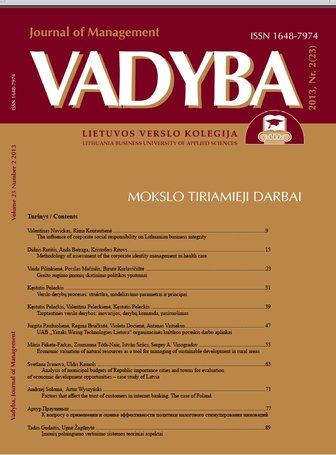ĮMONIŲ PELNINGUMO VERTINIMO SISTEMOS TEORINIAI ASPEKTAI
THEORETICAL ASPECTS OF COMPANIES‘ PROFITABILITY EVALUATION SYSTEM
Author(s): Ugnė Žagūnytė, Tadas GudaitisSubject(s): Economy
Published by: Lietuvos verslo kolegija
Keywords: Profit; Profitability; Companies‘ activity; prognosis methods; financial analysis.
Summary/Abstract: Company’s profit and profitability are among the most important criteria of evaluating company's business activity. According to the achieved profit and profitability performance results, different interest groups (e g. owners, employees, creditors) is deciding what type benefits they can expect from the company can get. Increase of profitability is interest in all type of businesses, regardless of their field of activity or size. Theoretical and practical aspects of profit and profitability are analysed in the article. Moreover the model for analysis is creates in the article and the methods of analyzing and prognose profit and profitability are evaluated in the article. It shall be noted, that the growing importance of financial analysis observed in the scientist researches. Different definitions of the profit indicator concept imply that the profit indicator is influenced by abundance of factors and complexity. The analysis of foreign and Lithuanian scientific researchers showed, that profit concept usually is defined as difference of gross revenues and gross cost. In assessment of profitability the use of financial analysis techniques as horizontal and vertical analysis, comparative indicators calculations are appropriate and justified methods used for financial analysis of profitability. In addition, for more detailed and deeper financial analysis of profitability of the performance should be chosen by various authors are recommending more sophisticated financial analysis techniques, such as DuPont analysis, the chain changes model or correlation analysis. In addition, the importance of the factors, which would be considered according to their level of their negative or positive impact, are evaluated in the article, looking from financial analysis perspective. It comes to the conclusion that selection of actions by the company for profitability increase is much more appropriated in these cases, when the actions are selected after detailed financial analyzes. In order to objectively assess the company's performance in various aspects, its competitiveness and sustainability possibilities, it is not sufficient to analyze the absolute profit values and based on it to take certain decisions , because the absolute profit ratio does not reflect the actual financial situation of the company. Much more detailed information is obtained by calculating the profitability indicators and comparing them with the values, which would be obtained by selecting different investment alternatives. After analysis of foreign and Lithuanian scientific, it can be concluded, that the financial analysis allows determine the company's performance aspects of the current situation and future perspectives. The analysis results allows to verify the effectiveness of the decisions in the past and settle background for making current and future management decisions.
Journal: VADYBA
- Issue Year: 23/2013
- Issue No: 2
- Page Range: 89-95
- Page Count: 7
- Language: Lithuanian

